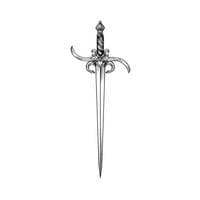Miyamoto Musashi (Fictional Character) tipo di personalità MBTI
Personalità
"Che tipo di personalità è Miyamoto Musashi (Fictional Character)? Miyamoto Musashi (Fictional Character) è un tipo di personalità ISTP in mbti, 8w9 - sp/sx - 854 in enneagram, RCUEN in big 5, SLE in socionics."
Head > Gut While Musashi might be seen as impulsive or just acting off instinct, he is quite thoughtful regarding his actions. Of course both types can do this, but Musashi is mostly driven by fear rather than anger. One of this biggest sources of fear was his father who treated him terribly as a child. This motivated him to become a great swordsman and surpass his father, so that he will no longer have power over him. The whole idea of being 'Invincible under the Sun' is a form of security in a way as being strong can protect him from the things he fears. sx6 > sp8 His love of fighting and battle is not a sign of lust. He wants to be powerful, not have power over others. He is excessive sometimes but not doing so as a need for stimulation. Which brings me to sp8, one of the most materialistic types. Musashi is a vagabond, has no desire for rewards. Has way better self control regarding his needs and wants. The aggressive nature of his is due to be sx6. As I mention earlier his need to be strong is to go against his inner fear. That is why he acts confident most of the time and seeks out opponents to overcome. Notice how cool/calm he is with people? None of that 8 boisterous energy. Someone made a good post on SLE so I'll need to reflect on that
Biografia
Miyamoto Musashi (宮本武蔵) is one of the main protagonists in Vagabond, and a historical figure considered one of the greatest swordsmen in Japanese history. As a young man he embarks on a journey to become the strongest samurai after being exiled from his village. He was born under the name "Shinmen Takezo" but later changed it to Miyamoto Musashi.
Personalità correlate

Sasaki Kojirō

Yoshioka Seijūrō

Takuan Sōhō

Tsujikaze Kōhei (Shishido Baiken)

Hōzōin Inshun

Otsū

Rindo

Matahachi Hon'iden
















